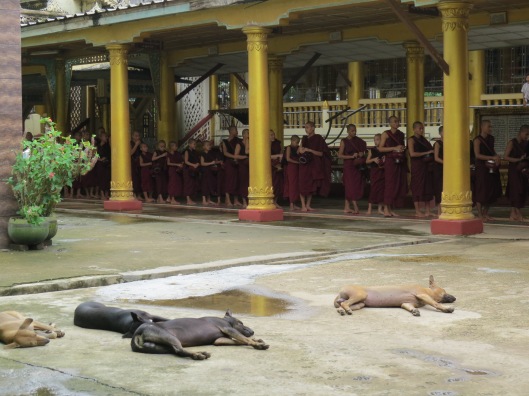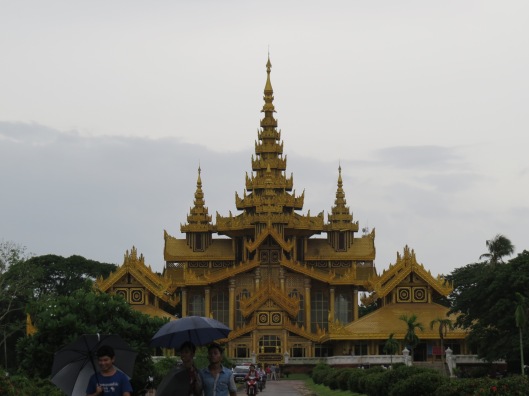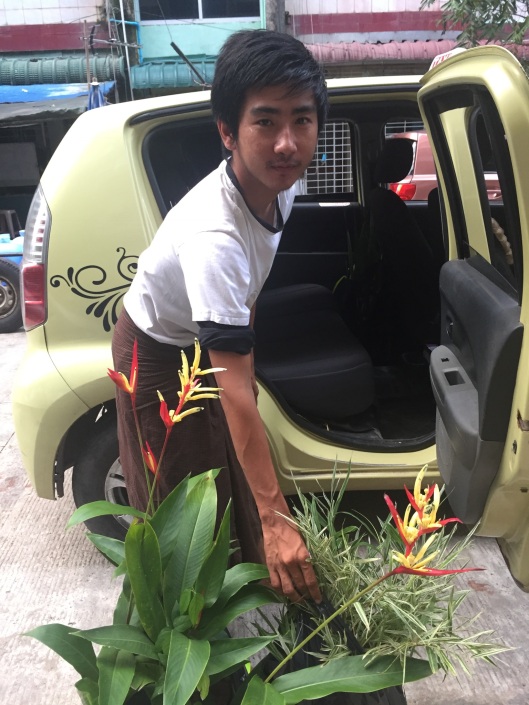


Bago – queuing monks, sleeping dogs and palaces.
Life is changing fast here in Yangon. Having extolled the virtues or otherwise of the bus service, most of which consists of 50 year old stock designed to operate on the left although Myanmar now drives on the right, with drivers and crew clearly operating on piece rates as you are given only seconds to get on and off and buses literally racing each other to the next stop in order to bag the most passengers, it is with some surprising regret that I have to announce that hundreds of new, air conditioned buses have been spotted parked up ready to hit the streets and begin to replace the old characters of the road.
The only other means of transport open to most people here is the taxi – and there are thousands of them. As a westerner they almost follow you around just waiting to fill your travel needs – although they are disappointed with me as I still travel mostly by bus. But I do want to tell the story of the average Myanmar taxi driver because frankly they restore your faith in human nature and must be some of the nicest taxi drivers in the world.

My taxi driver unloading plants for my garden this evening – yet another charming man. Not only didn’t mind taxi being taken over by triffids but offered me a bottle of water and just accepted what I gave him as a fare
When you hail a taxi in the street, the first thing is to ascertain your destination – sometimes easier said than done as my Myanmar pronunciation is appalling being tone deaf, but drivers seem to have undying patience to work out where you want to go. I have on more than one occasion had a taxi driver indicate that if I knew how to get to where I wanted to go to he would take me there if I navigated- so I am thinking of taking ‘the knowledge’ test for Yangon as I can usually get home. An Australian colleague tried to improve my pronunciation of my street Kan St and we came up with something like ‘ga st’ I proudly tried this out the following day only to meet with a complete blank – eventually after a group consultation with about 6 taxi drivers they said “oh you mean Kan St’ so since then I have stuck to a less subtle pronunciation. I used to say ‘Kan St opposite the lake’ until I discovered that Kan means lake. If all else fails I always carry a map.
The next step is to fix a price. So part of ‘the knowledge’ is to know how much a journey is worth. Generally it is a bit of a light hearted game or banter and quite formulaic with plenty of smiles resulting in a reduction of about 20%. I have had drivers set off having fixed a price for a journey they don’t even know the length of because I am navigating and have told them what I will pay. They have also refuse extra fare when I have shared a taxi and multiple drops were required.
I have had drivers offer me bananas, water, drive with the car full of plants so they could hardly see out, overloaded with 5 passengers. If you leave anything in the taxi – valuable or otherwise – they will look after it and go out of their way to get it back to you.
About the only negative experience has been when a driver said he needed to stop for fuel and I was taken to a taxi only garage with a very long queue. Petrol was being poured in by a garden hose via the boot and each car was taking about 20 minutes so I had to leave him to it as I really didn’t have the time to wait for hours.
The ultimate taxi experience came on Sunday with a day trip to Bago. Three of us were driven out of town and around Bago, the former capital full of golden pagoda, places and on this day, floods. Wonderful to visit out of season – then driven home to our door.
So a very positive experience of taxis but of course, this is really a reflection on the Myanmar people as a whole as the are so calm, caring, kind, open, friendly and honest. Something surely even the rapid changes here can’t alter.



Hi Jane Good to read your blog I always enjoy it. Enjoyed your description of the taxi drivers. Will have to compare notes with the Philippino taxis! I am thinking of going out to see Alex in November. It does sound as if you are enjoying your time in Yangon. A good time to be away, everything so messed up here. We have a heat wave at the moment which is lovely, as you know I love the sun! But everywhere is very dry, so I am having to water most evenings. Hope all is well. Love Shirley